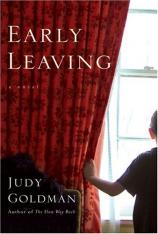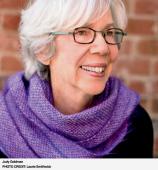Excerpt
Excerpt
Early Leaving: A Novel

Chapter One
Some memories we ignore. Others, little half-stories, we tell again and again, trotting them out for friends -- and even people we barely know -- like scrubbed children. We love what they say about us, the rosy image they project, exactly what we hoped and imagined our lives would be: bringing the baby home from the hospital, making up silly jingles about the shops and people we passed, turning everything into song. The baby's first lopsided smiles, definitely not gas, real smiles. Steadying him, that day in the park, as he took his first steps, the rolling Charlie Chaplin gait, the sun playing around us in the grass like a goldfish. The time we were at the lake and skipped rocks across a clean, calm surface. Later, when he dove in, water quickly erasing the path he'd taken.
See how the events of a child's life can appear no more complicated than photographs in silver frames?
Early's sentencing is October 6, tomorrow. Our lawyer, Donald Sanders, worked out a plea to second-degree murder with the district attorney, and Early agreed to take it. Which means that tomorrow morning, our son will plead guilty.
Donald says we have to prepare ourselves for the possibility that Early could get the maximum sentence. Life, with eligibility of parole.
It's also possible, Donald says, that Early could get a lesser sentence, fifty years, forty, maybe as low as fifteen years. The sentence is up to the discretion of the court.
Prepare ourselves for a life sentence? Life is what is given to a child by his mother. Not a judge.
If he gets forty or fifty years, I probably won't be around when he's released. Fifteen years? He'll be thirty-three when he's set free. That's almost as many years in prison as he's spent with us.
Just for tonight, I'm going to stop being terrified. I'll sink into the past, let memories fold over me, haphazard and slow. Not just the ones I tried to believe in all those years. The ones I tried to forget, as well. If the truth makes my reflection stare back at me, I'll tell myself, Get an eyeful. I realize that if I go deep, I might find that I should have seen the end coming. Which raises the question, Was there a point where I could've come between my son and the things that lay in wait for him? Should I have paid closer attention? Stepped in, instead of holding back? Or is it all just a matter of choices and chance, the way every one of us drifts close to danger but only some get sucked in? The question I don't want to ask myself: Was I the cause?
At five, Early's favorite bedtime story was the one I made up about the night he was born. I'd lie slant across the foot of his bed and say that on May 7, 1969, mothers and fathers from all over Charlotte rushed to the hospital to get a baby. I'd lightly squeeze his toes through the blanket, clear my throat to build suspense, and keep going. We heard there were dozens of newborns available for pickup in the nursery, I'd say. But instead of each set of parents choosing a baby in a levelheaded, orderly fashion, there was a huge ruckus. Mothers started shoving mothers, fathers punching fathers -- everybody was red-faced and yelling -- because we all wanted the same baby. And you know who that baby was (my exact words, Early's favorite part).
When the battles were finally over, I'd tell him, we'd beaten out the Dunhams, who begrudgingly settled for the baby one bassinet over, a howler named Chip. The Jacksons had reluctantly taken Eddie and gone home. The Todds sulked off carrying Steven, but not yet resigned to the idea of Steven. (I would keep going until I'd named all his friends.) Yes, your dad and I were clearly the winners, I'd say. We paraded through the halls of that hospital, out the front door, across the parking lot to our car, holding our sleeping baby aloft, like a trophy, for everyone to see and admire.
Over and over, Early would ask me to tell the story. The second or third time, I'd escalate the drama a notch -- wrestling one of the mothers to the floor, her shoes flying off like in a cartoon, arms and legs in the air like a bug, her cries: "Okay, okay, take Early! He's yours!" My sweet son would sit straight up in bed and wiggle with excitement. The idea of his birth causing such commotion! Imagine how much that little baby was wanted! His sheet and blanket would rustle, his head bob. That full head of fair hair he got from me.
Then I'd tuck him in, making sure the covers were snug under his arms and along both of his sides. The pin-oak leaves out the window would be moving slightly, causing the moon to crack into pieces and fall over his shoulders like silver confetti.
Finally, Peter would take over. He'd pat Early on the arm -- Peter believed it made a boy "soft" for his father to kiss him -- and say in his no-foolishness-about-it way, "Now go to sleep." My husband, setting limits.
Peter's a formal person, self-contained and private. A patent attorney with the oldest, most respected law firm in Charlotte. Board of trustees at the Y. Head of a million committees. Franklin G. Caldwell Award for "outstanding service to the community." All his life, a star. Handsome, with that straight hair falling naturally into place, giving the impression it's just been combed. Fit, five-ten, strong and compact, his muscular arms veiny. Nothing wasted, no extraneous anything. He looks like one of those men who are already seated in first class when you're passing through the plane to coach, the way they're so settled in, comfortable, even though you know they boarded just minutes before. They appear entitled, reading their Wall Street Journals, sipping their hot coffee.
Early Leaving: A Novel
- hardcover: 304 pages
- Publisher: William Morrow
- ISBN-10: 0060594586
- ISBN-13: 9780060594589


